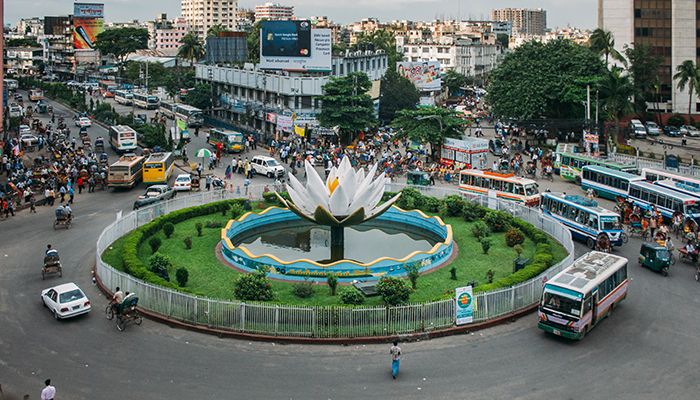
Desk Report
Publish: 29 Oct 2023, 05:57 pm

Shapla Chattar, Motijheel || Photo: Collected
Over the past few months, Bangladesh has faced significant economic challenges due to a combination of internal and external factors. These difficulties have caused considerable hardship for the population, especially as consumer prices have reached record highs.
The country's foreign exchange reserves have plummeted by half within a span of two years, and this decline has persisted month after month. Additionally, the value of the Bangladeshi taka has sharply decreased in relation to the US dollar, resulting in higher import costs.
Both remittance and export earnings have fallen below expectations, contributing to ongoing economic struggles. Inflation has remained at an all-time high, and investment levels have stagnated at lower levels.
Various factors have contributed to these economic setbacks, including the repercussions of the COVID-19 pandemic, the conflict between Russia and Ukraine, and insufficient policy measures. The situation is further exacerbated by increasing political uncertainty, which poses additional challenges to the economy, dashing hopes of resolving domestic issues.
Ahsan H Mansur, the executive director of the Policy Research Institute of Bangladesh, emphasizes the strong influence of political dynamics on the country's economic well-being. He underscores that without a resolution of the political crisis, the economic situation is unlikely to improve.
Mansur's comments come as Bangladesh experiences fresh turmoil, marked by clashes between supporters of the Bangladesh Nationalist Party (BNP) and law enforcement in the capital, along with the return of hartal protests by a major political party.
The core economic problem in Bangladesh centers on dwindling reserves, as import costs continue to surpass export earnings and remittances received through official channels. In September, remittance earnings declined by 13 percent year-on-year, with the lowest receipts in 41 months. Exports, another vital source of foreign currency, reached $4.3 billion, a 10.4 percent increase year-on-year but still the lowest figure in three months.
As of October 25, foreign currency reserves stood at $20.89 billion, sufficient to cover approximately four months of import expenses, compared to about $40.7 billion in August 2021. According to an estimate by the American credit ratings agency Fitch, these reserves are expected to further decrease to three months' worth of import coverage by the end of 2023.
Mansur points out that the unwillingness of the country's politicians to compromise is detrimental to the democratic process and has the potential to lead to more political unrest, which, in turn, hinders development and economic activities. He emphasizes the critical importance of addressing these issues for the nation's economy.
The World Bank has already reduced its economic growth forecast for Bangladesh by 0.6 percentage points to 6.1 percent for the current fiscal year.
Experts like Mustafizur Rahman and Anwar-ul Alam Chowdhury Parvez express concerns about the economic situation worsening due to escalating political uncertainty, making it challenging for any government to address the issues effectively.
Maintaining a stable and conducive environment is crucial for businesses, and this includes political stability, policy consistency, safety, and security, as noted by Fazlul Hoque.
Muinul Islam highlights the increase in money transfers through informal channels, contributing to economic volatility. Fazlul Hoque and Mostaque Ahmed Sadeque also emphasize the challenging macroeconomic situation and the need for a peaceful solution.
The stock market in Bangladesh has suffered, with turnover on the Dhaka Stock Exchange decreasing by about 40 percent in 2022-23. Many stakeholders in the stock market are experiencing significant difficulties.
The experts suggest that confidence in the economy can be restored through fair and transparent elections, compromises within the ruling government, and constructive dialogues among political parties. It's crucial for all political parties to act responsibly to prevent their actions from adversely affecting the economy, according to CPD's Rahman.
Subscribe Shampratik Deshkal Youtube Channel
© 2024 Shampratik Deshkal All Rights Reserved. Design & Developed By Root Soft Bangladesh